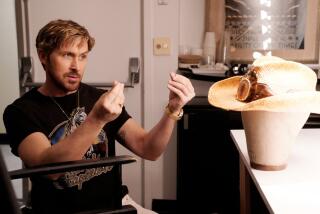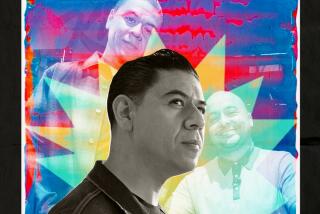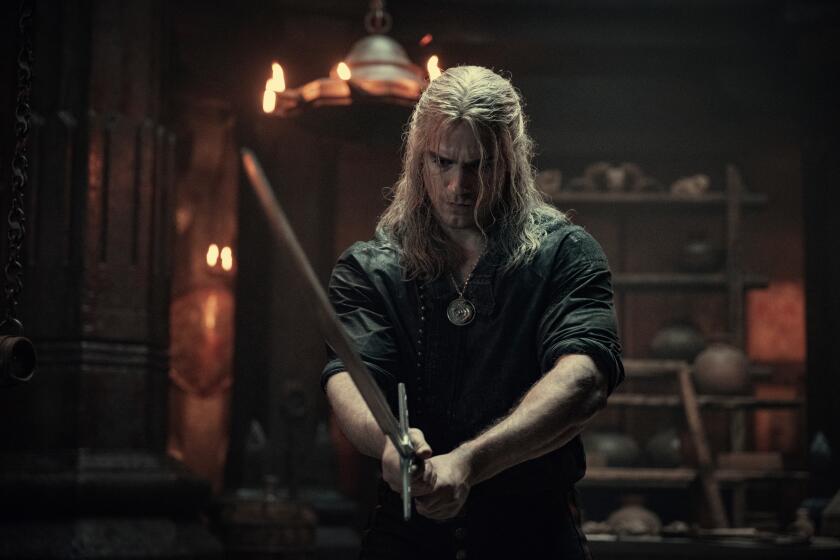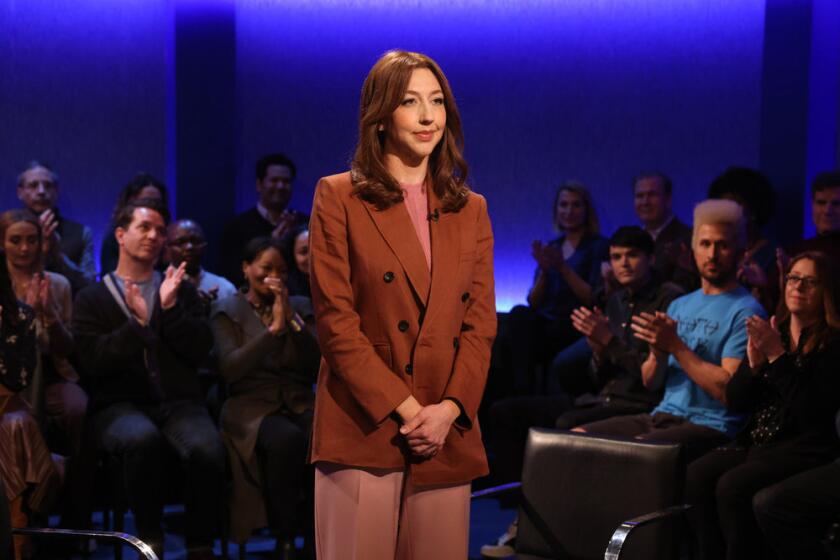‘Drunk History’ creator says he aims to inform, but thanks for the laughs
A third season of the highly unlikely, oddly lovable “Drunk History,” in which drunks tell stories from American history, begins Tuesday on Comedy Central. Like a man slipping on a banana peel, its humorous mechanism is easily grasped once seen, but the effects are surprisingly complex and sophisticated.
The idea is simple, though words tend to fail it: A person, typically a comedian or comic writer, versed in a historical event, drinks to a point of serious inebriation and then tells the story; an edited recording of that performance becomes the soundtrack — both the narration and dialogue — for a full-on, costumed, lip-synced reenactment. Three of these are packaged thematically into a half-hour to make an episode.
Derek Waters is the series’ creator and host — its alcoholic-spirit guide, if you will — and also a director and a member of its stock company, which is supplemented regularly by well-known names from comedy and beyond. The upcoming season includes appearances by Greg Kinnear, Parker Posey, Giancarlo Esposito, Michael McKean, and Henry Winkler. Sam Rockwell will play Bugsy Siegel opposite Dennis Quaid’s Lucky Luciano. Will Ferrell will play writer Roald Dahl, when he worked as a spy. Academy Award winner Octavia Spencer will play Harriet Tubman, when she did.
SIGN UP for the free Indie Focus movies newsletter >>
“People are always like, ‘Who’s the hardest person to work with?,’” Waters told me recently in his unprepossessing office downtown, in an hour stolen from post-production on a neighboring floor; a sign on his door read “I Have Seen Better Days.”
“No one,” he said, “because a hard person to work with would never say yes to this; it’s a whole day and no money.”
The idea was born one night in 2007, when after a few drinks, the actor Jake Johnson told Waters an unlikely story about the singer Otis Redding, “and I was just picturing Otis Redding having to come back to life, moving his lips to Jake’s words but looking at me and shaking his head; I don’t do drugs, so it wasn’t anything but having a weird imagination.”
That moment of inspiration eventually produced the first “Drunk History” short, made to show at the Upright Citizens Brigade, with Johnson as Aaron Burr and Michael Cera as Alexander Hamilton. Mark Gagliardi, who had been at Second City with Waters, provided the narration; Jeremy Konner, who still directs most episodes, ran the camera; and Waters “held the laptop to hit the audio over and over again” while the actors perfected their miming. (Konner will himself be a drunken narrator this season, for a segment on the California Aqueduct, with Tenacious D partners Jack Black and Kyle Gass as William Mulholland, who built it, and Frederick Eaton, who had the idea.)
The short was posted online, and in due course, under the flag of Funny or Die, became a Web series, which became a TV series. And here we are, at the dawn of Season 3, which will be the longest season yet, with 13 episodes — that means 39 stories to tell, and 39 nights on the tiles.
At first glance and maybe a few subsequent glances as well, there is something about the whole enterprise that feels less than benign, as when a pledge is forced to drink to excess to join a fraternity, where he may then drink to excess of his own free will.
The aim of the show, Waters said, is neither to make fun of drunks nor to mock history; if anything, it is tender to the drunks and respectful of the history, which it wants to make new, and, in its potted way, real. Likewise, the point of the drinking is not so much that it adds mayhem — it does add a little mayhem — as that it strips artifice from the telling and lets emotion and enthusiasm in.
Waters uses comedians and comedy writers as his narrators, “not for the obvious reason of their being funny but because they understand a beginning, middle and end to a story.” And because it’s all filtered through a 2015 (altered) consciousness, it feels especially direct and contemporary — bringing history alive! — in a way that high-priced, highly detailed Hollywood period blockbusters often fail to do.
Waters is also the person the narrator narrates to, and, though he is usually a few drinks behind the speaker, he follows them dutifully into inebriation, one or two sheets to the wind, to their three.
“It sounds like a bad idea, says my doctor. But it allows them to be free and comfortable, like, ‘Hey, we’re doing this together.’ And especially when it’s someone who hasn’t done it before, if they’re struggling with the story, or they’re not drunk and they’re just telling a story and it’s boring, then I have to be like, ‘Let’s do a shot together.’ It’s a lot easier for that to go well than ‘You should get more drunk.’ ‘Wait, I’m not doing it right?’ I’m just going, ‘Let’s have another drink.’ But that’s why I won’t be able to do the show forever; because as cool as history is, I want to live.”
Certainly there are viewers who will find this a questionable, even an irresponsible, even an immoral sort of comedy. Even as a fan, I wonder sometimes. But it plays as curiously innocent.
Said Waters: “I think the secret is that I’m not trying to make a comedy show; I’m trying to make a history show, but because of how I’m doing it, people will laugh, and not from, ‘Oh, it was so funny, they were so drunk.’ I would hate it if someone were like, ‘That show’s great, they get so messed up.’ I hope that’s not what you take away from it.”
In fact, you take history away from it.
“That is the secret goal,” Waters said. “I want them to make the audience feel a little dumb. You don’t see it coming, this person’s in an altered state, I’m laughing at them, oooooh — they just told me something.”
Indeed, the stories are told with such confidence, even apart from the Dutch courage and over the hurdles of encroaching incoherence, that I had once thought each narrator must be independently expert in his or her subject. But they learn on the job, receiving a “research packet,” with a rough beginning, middle, end of the story, which they learn and retell sober to a “Drunk History” producer.
Waters stays out of the way at this point, he said, because “I want it to be real, when they talk to me it’s the first time I’m hearing it from them. And nothing makes a drunk person happier than when you say ‘no’ when they ask you, ‘Have you heard this story?’”
A session can last six hours to produce a six-minute soundtrack. There are breaks for food and sometimes for oxygen.
“The first hour and a half, two hours I just let them get all the jokes out, knowing none of it will be used; but it helps them, now they’re comfortable. Now let’s tell the story again, and let’s tell the story again, just keep going to get to the point where you’re not trying to be funny, you’re now trying to tell history in the condition that you’re in.”
What about the morning after?
“The next day is all apology emails,” Waters said. “Like, ‘I’m sorry I got drunk for your show.’ ‘That’s what you’re supposed to do.’ ‘I didn’t tell the story.’ ‘No, you did tell the story or we would still be filming, I promise.’ But there’s never been anyone telling me, ‘Never do that to me again.’ So I’m proud of that.”
-----------------
‘Drunk History’
Where: Comedy Central
When: 10:30 p.m. Tuesday
Rating: TV-14 (may be unsuitable for children under age 14)
MORE:
British ‘Detectorists’ on Acorn TV uncovers a comedy treasure
Starz’s ‘Blunt Talk’ with Patrick Stewart a weird and welcome addition
‘Documentary Now!’ a ridiculously wonderful anthology of doc parodies
More to Read
The complete guide to home viewing
Get Screen Gab for everything about the TV shows and streaming movies everyone’s talking about.
You may occasionally receive promotional content from the Los Angeles Times.







